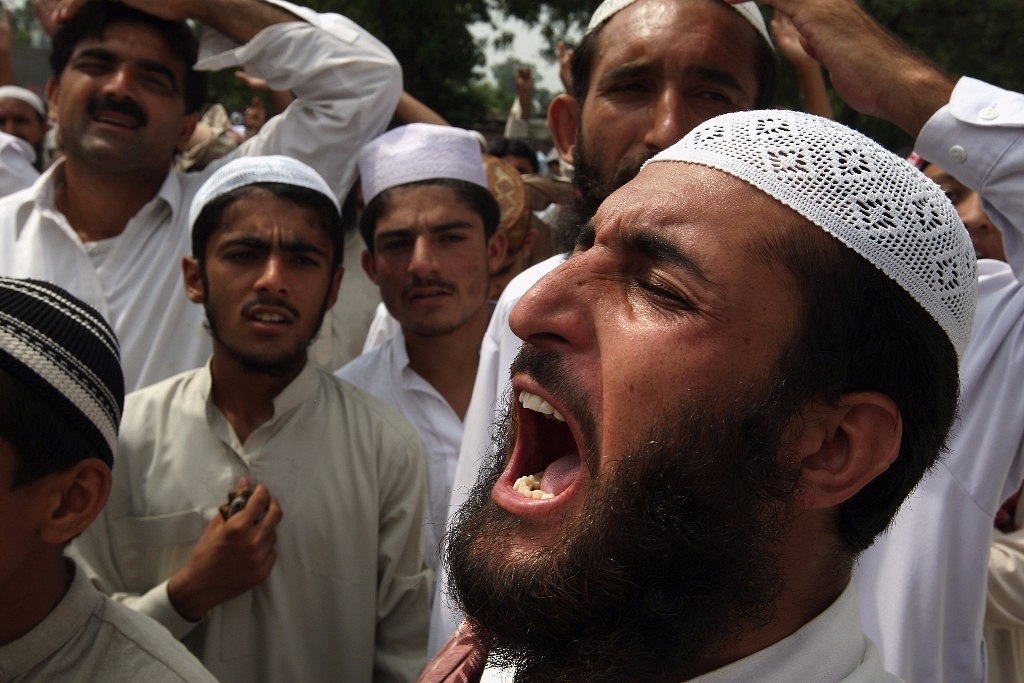World
In Case It Wasn’t Obvious, Islamists’ Hold Over Pakistan Has Now Grown Even Stronger
- ‘Form-A’ is a document which is submitted at the time of election by candidates in Pakistan. In this, “I solemnly swear” had been replaced with “I believe” in a clause relating to a candidate’s belief in the finality of prophethood of Prophet Muhammad. This clause had been made not applicable to non-Muslim candidates. All hell broke loose.

The latest case shows how strong Islamists have already become in Pakistan. (John Moore via Getty Images)
Early morning today (27 November), Pakistani Law Minister Zahid Hamid tendered his resignation to the Pakistani Prime Minister Shahdi Khaqan Abbasi, ending what had become a virtual Islamist siege of Pakistani capital of Islamabad and Rawalpindi.
What it actually might be - is the first in a series of the events through which the Islamists and Pakistani military chip away power from an already weak and barely functioning civilian government.
The events of the past few weeks stem from the anti-Ahmadi bigotry in the Pakistani society, a cause which has been championed by the Islamists. Ahmadiyya or Ahmadis, a community which gave Pakistan it’s first Nobel laureate Abdus Salam, and one which had played a very active role in its creation, are now heavily persecuted in Pakistan. After an amendment to the Pakistani Constitution in 1974, Ahmadis were now categorised as non-Muslims, making Pakistan the only country to label them so.
The roots of this conflict go back the Ahmadi belief of their founder being the Mahdi or the Messiah awaited by the Muslims, which is seen at odds with the mainstream belief of Prophet Muhammad being the last Prophet of Islam.
The recent agitation was launched by Barelvi clerics against a change in the oath taken by candidates standing for election to political office in Pakistan, which some saw as a measure to accommodate the sentiments of Ahmadis. As the Pakistan daily, Dawn, reports:
The change was reversed by the government but the leaders of the agitation had called for a sit-in at a crucial intersection that connects Rawalpindi with Islamabad, demanding those involved in this change to be punished.
The agitation was led by the hardline Islamist outfit, Tehreek-i-Labbaik Ya Rasool Allah (TLY) under its leader Khadim Hussain Rizvi, who, along with thousands of his followers, had blocked roads and access to civic infrastructure in Islamabad since 6 November. With time, the protests had spread to other Pakistani cities, and eventually the Pakistan Supreme Court had directed the protestors to disperse. After the protestors refused to adhere to the court order, the government ordered an operation to end the sit-ins. This led to violence with several casualties and the operation was finally called off.
That the Pakistani military decided to defy the government order, gives credence to the idea that the military and the Islamists are hand-in-glove in undermining the civilian government. The democratically elected government, already besieged since last July, when the erstwhile PM Nawaz Sharif had to resign owing to corruption charges, finally succumbed to the Islamists’ wishes.
The agitation has finally ended, but not before the government had to agree to all their demands. The demands, other than getting the law minister to resign, included a report to find the people responsible for changing the election oath, and those who conducted the operation to clear the protestors.
Apart from these, several other demands have also been met by the government according to the TLY. These involve easier booking of FIRs under the blasphemy law, no ban on loudspeakers, and no leniency for people booked under the blasphemy law. Additionally, as this reports mentions, a “board of clerics led by Pir Muhammad Afzal Qadri will be set up to probe remarks made by Punjab Law Minister Rana Sanaullah against the persecution of Ahmedis. Sanaullah will have to accept the decision made by the board.”
The future of the people named in these reports, and their families doesn’t look good.
The blasphemy laws in Pakistan have been widely criticised around the world, not least for their continued misuse to oppress the already disenfranchised minorities. The civilian government’s bowing down to Islamists is a sign of the dire conditions the minorities and other dissenters are set to face as the Islamists consolidate power.
There are fears that the government has set a precedent, and military proxies might want to exploit this in getting more unreasonable demands met. All they need to do, is to get a few thousand protestors to the cities, and block all civil life till the government accedes to the demands. As the government is slowly drawn down and the rule of law weakens, the military-mullah regime looks as strong as ever.
Introducing ElectionsHQ + 50 Ground Reports Project
The 2024 elections might seem easy to guess, but there are some important questions that shouldn't be missed.
Do freebies still sway voters? Do people prioritise infrastructure when voting? How will Punjab vote?
The answers to these questions provide great insights into where we, as a country, are headed in the years to come.
Swarajya is starting a project with an aim to do 50 solid ground stories and a smart commentary service on WhatsApp, a one-of-a-kind. We'd love your support during this election season.
Click below to contribute.
Latest